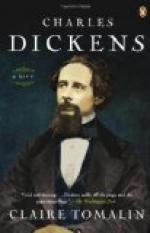Extracts like these could be multiplied to any extent, and the question arises, why did such a change come over the spirit of Dickens? Washington Irving, at the great New York dinner, had called him “the guest of the nation.” Why was the guest so quickly dissatisfied with his host, and quarrelling with the character of his entertainment? Sheer physical fatigue, I think, had a good deal to do with it. Even at Boston, before he had begun to travel over the unending railways, water-courses, and chaotic coach-roads of the great Republic, that key-note had been sounded. “We are already,” he had written, “weary at times, past all expression.” Few men can wander with impunity out of their own professional sphere, and undertake duties for which they have neither the training nor acquired tastes. Dickens was a writer, not a king; and here he was expected to hold a king’s state, and live in a king’s publicity, but without the formal etiquette that hedge a king from intruders, and make his position tolerable. He was hemmed in by curious eyes, mobbed in the streets, stared at in his own private rooms, interviewed by the hour, shaken by the hand till his arm must often have been ready to drop off, waylaid at every turn with formal addresses. If he went to church the people crowded into the adjacent pews, and the preacher preached at him. If he got into a public conveyance, every one inside insisted on an introduction, and the people outside—say before the train started—would pull down the windows and comment freely on his nose and eyes and personal appearance generally, some even touching him as if to see if he were real. He was safe from intrusion nowhere—no, not when he was washing and his wife in bed. Such attentions must have been exhausting to a degree that can scarcely be imagined. But there was more than mere physical weariness in his growing distaste for the United States. Perfectly outspoken at all times, and eager for the strife of tongues in any cause which he had at heart, it horrified him to find that he was expected not to express himself freely on such subjects as International Copyright, and that even in private, or semi-private intercourse, slavery was a topic to be avoided. Then I fear, too, that as he left cultured Boston behind, he was brought into close and habitual contact with natives whom he did not appreciate. Rightly or wrongly, he took a strong dislike for Brother Jonathan as Brother Jonathan existed, in the rough, five and forty years ago. He was angered by that young gentleman’s brag, offended by the rough familiarity of his manners, indignant at his determination by all means to acquire dollars, incensed by his utter want of care for literature and art, sickened by his tobacco-chewing and expectorations. So when Dickens gets to “Niagara Falls, upon the English side,” he puts ten dashes under the word English; and, meeting two English officers, contrasts them in thought with the men whom he has just left, and seems, by note of exclamation and italics, to call upon the world to witness, “what gentlemen, what noblemen of nature they seemed!”




